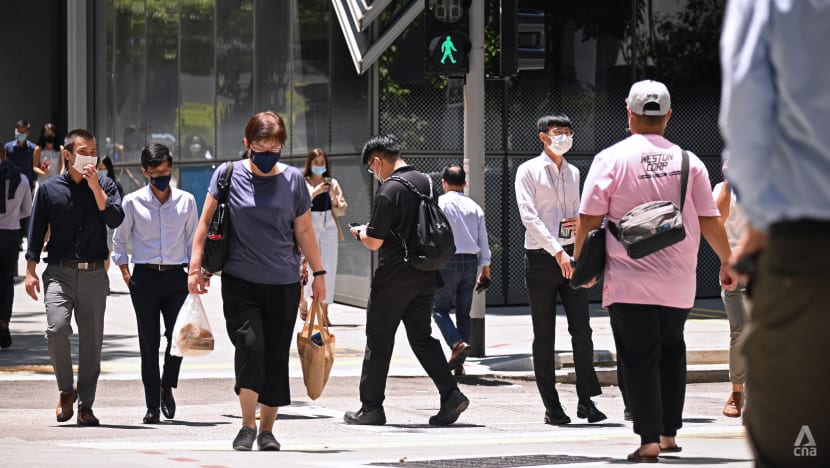Will Singapore move in the direction of US, and consider a ban on non-compete clauses in labour contracts?
The Manpower Ministry and tripartite partners are developing a set of guidelines “to shape norms and provide employers with further guidance” on including non-compete clauses in labour contracts.

Office workers cross a road in Singapore's financial district of Raffles Place on Sep 6, 2021. (File photo: CNA/Gaya Chandramohan)
SINGAPORE: Authorities in Singapore are working on a set of guidelines regarding non-compete clauses in employment contracts, but will the country follow in the footsteps of the United States and consider banning such clauses?
Unlikely, according to employment lawyers that CNA spoke to.
Non-compete or restraint of trade clauses are provisions found in labour contracts that prevent people from working in the same industry for a certain period of time. If flouted, companies could take their former employees to court to seek an injunction or compensation.
Such clauses were first developed as a way for employers to safeguard interests such as confidential information, trade secrets and customer relationships.
But as they become more pervasive, the US Federal Trade Commission - which works to protect competition and consumers - has called for a ban on non-compete clauses, calling them an “often exploitative practice” that suppresses wages and curbs business innovation.
In Singapore, non-compete clauses are not uncommon and could range from anywhere between three months and two years, lawyers told CNA.
Such clauses are typically more prevalent in contracts for senior and management-level positions and in certain industries - such as sales, financial services and technology - where there is a manpower crunch and the nature of work can be highly sensitive and reliant on trade connections, they added.
That said, these contractual terms have also found their way into contracts for rank-and-file roles, prompting former Member of Parliament Zainal Sapari to call out, back in 2019, such instances as unethical behaviour by employers.
Currently, the Ministry of Manpower (MOM) and tripartite partners are developing a set of guidelines “to shape norms and provide employers with further guidance” on including non-compete clauses in labour contracts, Manpower Minister Tan See Leng said in a written parliamentary reply in April 2023.
“Details will be made available in due course. We will also continue to monitor employment trends and ensure our policies remain relevant,” spokespersons from MOM and the Tripartite Alliance for Fair and Progressive Employment Practices (TAFEP) told CNA in a joint reply.
The tripartite partners’ position is that "employers should not have restrictive clauses in their employees’ employment contracts unless there is a genuine need for such clauses to protect legitimate business interests".
Legitimate business interests include advantages and assets regarded as the employer’s trade secrets and confidential business information, as well as trade connections or relationships with clients which have a direct impact on an employer’s sales, business prospects and profitability.
TAFEP has not seen a rise in cases involving unreasonable contractual clauses, with the agency receiving around 20 such reports on average each year, spokespersons told CNA.
These cases include employers asking for liquidated damages from lower-wage employees who wish to leave the company within a specific timeframe, or imposing a restraint of trade on employees who do not have access to trade secrets or confidential business information.
Employers involved in these cases “have generally been cooperative in removing or not enforcing such clauses” when engaged by MOM and TAFEP, they added.
BALANCING EMPLOYER, EMPLOYEE INTERESTS
Lawyers said Singapore is unlikely to follow in the footsteps of the US to consider an outright ban on non-compete clauses.
This is because such restrictive covenants still “aim to strike a balance between protecting the employer’s legitimate proprietary interests and the employee’s right to work”, said Ms Jenny Tsin, co-head for employment at WongPartnership.
A one-size-fits all approach is also not suitable in the case of non-compete clauses, as each case should be viewed based on its own facts, she added.
Others pointed to the need to maintain Singapore’s business-friendly environment.
“We are in a difficult position as we want to continue attracting businesses to Singapore, so we cannot be too employee-centric,” said Ms Muntaz Zainuddin, partner and head of the employment practice at IRB Law.
More importantly, Singapore's courts require employers to show that its non-compete clauses are legitimate and reasonable based on clear principles set out.
“The starting point is that these clauses are prima facie unenforceable,” said Ms Muntaz, adding that the courts “apply a strict test” to see if the company can meet these principles.
For instance, such clauses can only be enforced if they serve to protect a legitimate business interest and the scope is reasonable to the interests of both the parties and the public.
Some factors used to examine reasonableness include the scope of employees, activities and geography that comes under the restrictions.
As an example, a non-compete clause may be viewed as unreasonable if it applies to all employees, regardless of seniority, the nature of work or access to confidential information, said JCP Law’s director Jeremy Cheong.
He added that employers generally face “several hurdles” when it comes to proving the enforceability of non-compete clauses.
“If they are seeking compensation, they will have to show what they have lost from an employee joining a competitor and it’s not easy to prove that,” said Mr Cheong.
“If they are seeking an injunction to stop the employee from working for a competitor, it also depends on when the employer found out. Let’s say they found out two years later then an injunction is clearly out of the question.
“So these are some of the practical realities that must be considered, which is why I don’t think (the authorities) are seriously considering having a need to expressly ban these clauses,” he added.
RECOMMENDATIONS FOR GUIDELINES
The guidelines that authorities are currently working out will have no legal powers, although Mr Cheong noted the “unique situation” in Singapore where employers tend to be “very respectful” of non-binding advisories.
As a start, Ms Muntaz said it would be good for the guidelines to recommend that employers consider making fair payment to employees during the time a non-compete clause is imposed or being negotiated.
Ms Tsin suggested some guidance on the maximum duration of an enforceable restrictive covenant.
The guidelines could also include “broad guidance” on the categories of employees who should not be subject to restrictive covenants. These could be rank-and-file workers or employees with no access to confidential information or not in a position to influence customers and suppliers, she said.
MOM and TAFEP noted that employment contracts with fair and clear employment terms can serve to protect both the employer and employee. They also help build trust between both parties.
Apart from including key employment terms such as working hours and basic salary in a contract, employers are encouraged to explain these terms in a clear manner and provide opportunities to clarify any doubts.
Employees should also read their employment contracts thoroughly, ensure they understand all contractual terms before signing and seek clarifications when in doubt, the spokespersons said.
“Employers and employees are encouraged to visit TAFEP’s website for more information about fair employment contracts, or contact TAFEP for advice and assistance,” they added. “Unionised employees who face issues with unreasonable contractual clauses may also approach their unions for assistance.”



















